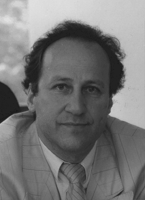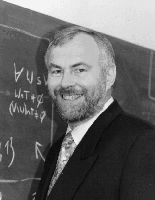ZIB: Computational Mathematics as Key to Key Technologies
March 22, 1999

Peter Deuflhard, founder and, since 1987, president of the Konrad Zuse Zentrum for Information Technology in Berlin, ponders the criteria for real innovations in computational mathematics and provides an admirably concise commentary on the institute's orientation: Supercomputing, he says, should be more than just computing on supercomputers.
Peter Deuflhard
During the International Congress of Mathematicians in Berlin last summer, lots of colleagues asked me for details about ZIB, the Konrad Zuse Zentrum for Information Technology in Berlin. One reason for their interest might be that plans for a number of comparable institutes are now being discussed, in the U.S. and worldwide.
Founding Idea
Formally speaking, ZIB was founded in 1984 by the political administration of Berlin as a center for information technology (a term that was deliberately left rather vague---including, for example, both communication technology and process simulation), before any leading scientists had been successfully hired.
Scientifically speaking, I founded ZIB in 1986 on the basis of a dual concept: computer science, including a supercomputer center, and scientific computing, understood to cover the full range from application-oriented mathematical research, through the construction of numerical algorithms and the development of software, to direct cooperation in selected important fields of application. It has been my firm belief that researchers who make real innovations in computational mathematics must be aware of the difficulties in the numerical treatment of hard real-world problems and, at the same time, must start from a thorough theoretical understanding of the mathematical (and often scientific) basis of these problems. In other words, supercomputing should be more than just computing on supercomputers.
Organization
Since 1987, I have been president of ZIB (a position much like that of director in most scientific institutes); my continuing personal research interests are in differential equations of all kinds: ordinary, partial, countable (the latter being sets of thousands to millions of ODEs arising, for example, in polymer chemistry). At present, the numerical methods branch, under my scientific supervision, consists of the numerical analysis and modelling, scientific software, and scientific visualization departments.
Martin Gr�tschel, who became vice president of ZIB in 1991, runs the discrete mathematics branch, which today includes the departments of optimization and scientific information systems. Very recently, Alexander Reinefeld joined ZIB. With a personal research interest in parallel and distributed systems, he heads the computer science branch, which includes the supercomputer center. The leading circle also includes a high-level administrator, which appears to be extremely important for ZIB as a whole.

Martin Gr�tschel, vice president of ZIB since 1991, heads the institute's discrete mathematics branch.
Controlling Boards
ZIB is controlled by an administrative board wherein the three Berlin universities (Free University, Humboldt University, University of Technology) have the majority of votes, dominating both representatives of scientific institutes outside the universities and government representatives. Any important structural decisions within ZIB must be approved by this board. A scientific advisory council meets roughly once a year to discuss questions of research and development with the ZIB scientists and to report to the administrative board. The present chair of this council is Tom Liebling from Lausanne. Until recently, Werner Rheinboldt, a former president of SIAM, was one of the international members of the council.
Access to computing time on the supercomputers of ZIB is exclusively decided by a ZIB-independent admission council made up of scientists from universities.
University Connections
I hold a chair in scientific computing in the faculty of mathematics and computer science at the Free University, Martin Gr�tschel has a chair in discrete mathematics in the faculty of mathematics at the University of Technology, and Alexander Reinefeld is a professor in the department of computer science at Humboldt University. All three of us formally have reduced teaching responsibilities but often nevertheless teach full loads.
Senior scientists at ZIB, moreover, take on significant responsibility for teaching at the three universities, mainly at the graduate level but also doing a fair amount of undergraduate teaching. Quite a large number of Diplome and PhD students are supervised by ZIB members.
Funding
The basic funding for ZIB is guaranteed, in principle, by the Land of Berlin, in just the same way as for the universities. (As nearly everywhere in the world today, our situation is rather insecure in this respect.) In addition, the research activities of ZIB have generated considerable outside funding in the form of competitive proposals (much like those submitted to the National Science Foundation or the Department of Energy in the U.S.) or industry support. The costs for the supercomputers as well as for the new ZIB building have been shared by the local government of Berlin and by the German government.
Staff
In 1986, when ZIB started along the lines indicated here, about 90 people were employed in the then-existing supercomputer center. Today, ZIB employs approximately 160 people; about 40 of them work in the computer science branch (including the supercomputer center), 20 are administration and library staff, and the rest are scientists in the scientific computing division (roughly half of them paid on an outside-funding basis).
Projects
ZIB runs a rather diversely funded mix of long-term projects (mostly basic research), medium-term projects (mostly with public funding, in-house or outside), and short-term projects (typically industrial projects). Basic research topics include adaptive multilevel finite-element methods, classical quantum dynamics, conformation dynamics of molecular systems, computer algebra in nonlinear dynamics, and virtual labs in the numerical methods branch, and polyhedric combinatorics and graph theory, general integer programming, and number theoretic and geometric programming methods in the discrete mathematics branch. Areas of emphasis for the computer science branch include parallel computing, benchmarking, and scientific cooperation with high-level users of our supercomputers.
Just a few of the numerous application areas in which ZIB scientists currently work are chemical process simulation, clinical cancer therapy, biomolecular drug design, integrated optical networks, brain research, public transport planning and scheduling, telecommunications, energy distribution, and electronic publishing and information systems design. A selection of these projects will be described in a forthcoming issue of SIAM News.
Additional information about ZIB can be found on the Web (http://www.zib.de).
Peter Deuflhard is president of the Konrad Zuse Zentrum in Berlin.

